Joshua Becker's Blog, page 60
April 16, 2020
Minimalism: Historically Important

Finding the life we want by embracing minimalism isn’t about giving up everything. Nor is it about holding on to everything and just trying to organize it better. Instead, it’s about reducing the number of our possessions to a level that sets us free.
Minimalism isn’t about owning less just for the sake of owning less. It’s about owning just the right amount of anything (and everything).
I have always found it important that the wisdom of the ages agree on the value of this approach to living. And the value of this approach to living may be as important today as ever.
12 years ago, when my wife and I began minimizing our home and removing the nonessentials, I would often remark to her, “This is fantastic. Owning less stuff is so freeing! I wonder why nobody ever told me about this before?”
Before long, though, I started to catch myself. Was it really that nobody had ever told me about minimalism before? Or was it that I just wasn’t listening?
In my head, I began recounting the mentors I had heard who spoke about the spiritual dangers of materialism. And beyond that, throughout my life, I had read and heard dozens of challenges to reject the empty promises of consumerism and follow a way based on higher values, not to mention all the financial advice about not overspending your means.
I began to do research and discovered that minimalism is not a new movement at all. Whether specifically labeled as minimalism or not, it has been practiced and encouraged for thousands of years—since well before our current society of mass-produced goods, well before suburbanization, and even well before the Industrial Revolution.
Under all kinds of economic conditions, minimalism has been promoted as a rewarding way of life. In good times and bad, people have encouraged the pursuit of minimalism.
Today, we recognize some of the people in recent centuries who have encouraged this approach to life, including Henry David Thoreau and John Ruskin. I even hear them referred to as the “fathers of the minimalist movement.” But minimalism predates all of them—by a long shot. The minimalist lifestyle may be gaining in popularity today, but it is the furthest thing from new.
Duane Elgin, who is often credited with bringing the phrase voluntary simplicity into the public discourse, said it to me like this: “I tell people that I’m the great-great-great-great-great-grandson of this movement that got started a couple of thousand years ago with the teachings of Jesus, Buddha, and other great sages who understood the value of simplicity. What is new is not the value of simplicity but rather the conditions of the world where it is understood.”
Living with less has always been freeing and life giving, filling people with hope and purpose. It has enabled human beings to expand in spirit and to live as more than mere accumulators of possessions. And therefore, minimalism is not a brand-new approach to life invented as a response to our overproduction of consumer goods. Quite the contrary. Our most trusted moral leaders have promoted it for centuries.
It is a historically important movement. And it is as important today as it’s ever been.

April 14, 2020
Minimalism in a Crisis
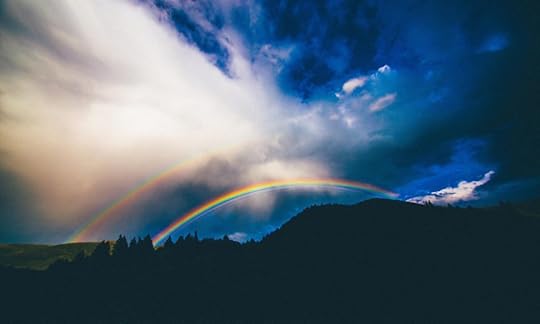
There’s an old boating safeguard of throwing cargo overboard to lighten the load of the vessel during times of distress. The official word for the cargo cast overboard is jetsam.
The throwing off of unneeded cargo or equipment can help to lighten the vessel, to stabilize it during a storm, or remove flammables during a fire.
I can remember first hearing about this practice when I was kid hearing the old story about Jonah and the whale. But this is a practice that is still used today.
I think the analogy is helpful as we consider minimalism in a crisis—the benefit of removing unneeded cargo from our lives. To be fair, this principle applies to any crisis we may be facing such as the loss of a job, an illness, or a natural disaster.
But today, allow me to address minimalism during a societal crisis. Specifically, what we’re all going through right now trying to make the sense of COVID-19.
There is a reaction that some might have during a crisis to gather as much as possible and hoard as much as they can in their homes. We can see that reaction around us as people run to the grocery store or the pharmacy, grabbing as many things as they possibly can in their cart.
But there is an opposite response to this crisis we should consider: throwing off the non-essential cargo from our lives. Rather than hoarding possessions, we would use this crisis to begin removing the ones we do not need to help us find better stability.
Why? Why would use this crisis to own less?
Let me offer five important benefits:
1. Freedom.
When we own less, we find more freedom in our spaces and we find more freedom in our life.
When our homes are filled with unnecessary possessions, the environment is constricting and frustrating. But as we declutter our spaces, our homes become calmer and more peaceful.
2. Flexibility.
Another reason we throw off non-essential cargo is the flexibility that it provides us going forward. The world is going to change, no doubt about it. Your life is going to change. Normal will be new.
Who knows what tomorrow holds? Who even knows when this storm is going to end? But when we own fewer possessions, we become more flexible for the future—whether we need to move, find a new job, or make changes in the way we live.
3. Financial stability.
As we own fewer possessions, our life costs less. It costs less to maintain our things. Even more importantly, we begin to buy less going forward. Suddenly, it is easier to find financial stability than before.
4. Benefit others.
Another reason to embrace minimalism in a crisis is because it helps us provide goods to those who need it. I realize, at this point in time, different locations have different guidelines in place for donations. But if your local authorities have deemed it safe, this is an important time to help those who desperately need it.
5. Security.
One last benefit of throwing off unneeded cargo during a crisis is that we begin to look for security in places that can actually deliver. One of the problems in looking for security in material possessions is that possessions never provide the security we desire. That’s why people start hoarding more and more and more. They believe the added items will help them feel safe, but they never do.
Instead, we can turn to friends and family and faith. We can turn to things that we know to be true about ourselves: our talents, our abilities, our work ethic. When we begin to rely on those things for our security going forward, we begin to find more lasting security in a crisis.
Now, don’t mishear me. I’m not saying it is wise to go out tonight and throw away every single thing you own.
What I am saying is this: Whether you are going through a personal crisis or societal crisis, begin to see how owning less can help bring back control of your life. Minimalism will bring intentionality. It can bring freedom and flexibility and financial stability going forward.
As you remove the items from your home and life that you do not need, you will be more stable and more equipped to weather any crisis that you may be going through.

April 11, 2020
Inspiring Simplicity. Weekend Reads.
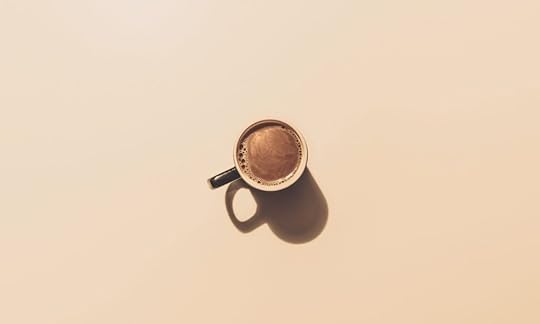
Thank you for being part of the Becoming Minimalist community. In times like these, it is even more essential to focus on things that matter. Minimalism paves that pathway.
By owning fewer possessions, we reserve time, money, and energy for the things that matter most. So take some time to focus on the things you own and what can be removed (today or in the future).
We’ll get through this—and we’ll be better because of it.
To keep your mind focused on simplicity and intentional living, here is a personally selected list of encouraging articles that have been published recently:
Minimalism Could Save You Thousands of Dollars—Here’s How | MSN by Daphne MacDonald. Though we live in a world of constant consumption, we don’t need much to be happy. The accumulation of stuff costs money and can lead to living outside our means and piling on debt.
Minimalism Renewed | The Minimalists by Joshua Fields Millburn. This pandemic is putting things in perspective.
Go Beyond Decluttering to Achieve that Minimalist Lifestyle | Motherly by Elesha Piper. Beyond the physical stuff, we can examine other areas of life for excess as well.
4 Ways to Start Being a More Thoughtful — and Sustainable — Consumer | Popsugar by Christiana Figueres. If you’re interested in lessening your own footprint and breaking free from the consumption trap, here are three easy ways to start rethinking your relationship to buying more, more often.
7 Ways to Help People During This Crisis | Joshua Becker on YouTube

April 9, 2020
“Normal” is Always New
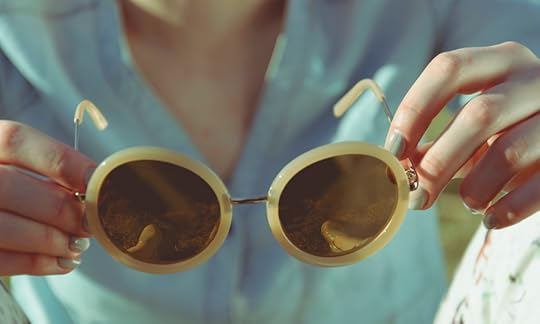
Crazy times we’re living in. Can I offer a helpful thought?
I’ve been hearing a lot of conversations about “the new normal,” and how life is never going to go back to the way it was before. One person recently wrote to me, “I’m beginning to realize life is never going to be the same.”
And they are right.
We have all been asked (or forced) to change our present reality. Getting used to our new reality, both in the short-term and the long-term, is going to take some time. No doubt, there have been significant changes and will be many more.
But I want to offer you a helpful reminder today:
Your life was never going to be the same tomorrow as it is today.
“Normal” was always going to be different and new.
Our world is constantly changing and our lives are constantly changing. Sometimes for the better, sometimes for the worse. Sometimes small and incremental, sometimes abrupt and significant. Sometimes because we desire change, sometimes because change is forced upon us.
But life is constantly changing.
I can tell you that my life today is a lot different than it was one year ago. My life one year ago was very different than it was five years ago or 15 years ago. And the world has changed a whole lot during that time as well.
The only constant in life is change. And “normal” tomorrow was always going to be different than normal today.
Normal is always new.
It is our responsibility to live in the present and make the most of our circumstances—whatever they look like today and whatever they look like tomorrow.
We accept the good, we accept the bad, and we make the most of the season right in front of us—regardless of how it looks today or tomorrow. That is our responsibility to ourselves and the constantly changing world around us.
Stay healthy, stay well, stay focused. We’ll get through this together.

April 6, 2020
When the World Is in Chaos, Control What You Can

There are times in our lives when we are confronted with the reality that we are not in control of the world around us.
As hard as we try, and as much as we’d like to think we’re in control, the reality is, we are not. And there are seasons and circumstances that remind us of that fact.
A natural disaster, a terminal diagnosis, a wayward son, an unexpected layoff… each of those come to mind as examples.
At this current moment in time, almost everyone in the world, simultaneously, is being confronted with the reality of lost control through the spread of a virus. A tiny virus, invisible to the naked eye, has brought the world to a screeching halt, disrupting everything in its path—even life as normal.
Our control has been upended. No doubt about it.
We, of course, never had as much control over our lives and the world as we thought we did, but still, it is hard to lose the little that we had. The world, it feels, has spun into chaos.
So how do we respond when the world is in chaos? How do we begin to move forward?
For one, we take back control of what we can control—even in the smallest of ways.
We’ve all been reminded that we are not in ultimate control of the universe. But that doesn’t mean we’ve lost all ability to maintain control over our lives. Even if our usual day-to-day opportunities have been taken from us by another, there is still much we can control.
For example:
We can still control what time we wake up in the morning.
We can still choose to get ready in the morning for the day ahead.
We can eat healthy. We can remain physically active.
We can make our bed in the morning, we can choose to reset our home in the evening.
We can choose what we watch and listen to, and we can control what time we turn off the television at night.
We can always control our attitude and our response to the people and events around us.
We can love our family.
We can choose kind words in conversations.
If you are a man or woman of faith, you can choose to rely upon it during this time.
We can still decide to make the most of each day in front of us.
Controlling what you can might not seem like much, but it’s something.
Actually, it’s a lot more than something. It is an essential strategy for each of us going forward.
It is the first step in moving from a reactive life to a proactive one. And it is the first step in making the most of our current circumstances.
So, focus your energy there, even if it seems like very little. When the world is in chaos, control what you can.
Stay healthy, stay well, and stay focused. We’ll get through this together.

April 1, 2020
A Break From FOMO
Editor’s Note: This is a guest post from Seth Riley.

Up until a month ago, it seemed like everyone else in the world was getting what we’ve always wanted.
Every time we opened social media, there they were: taking some awesome trip, fielding the opportunities we ought to have gotten, achieving what we only dream of.
Meanwhile, we sat on our couches, missing out on everything. Even worse, it felt as if this cycle would continue forever. Given the constant advance of technology, it seemed pretty impossible that any of this overwhelm would lessen anytime soon.
But these days, there is a lot less to miss out on. Everything has been cancelled and, for a while, we’re all living the same shut-in life.
It’s hard, in the thick of this global tragedy, to see many positives. So many people are horrifically sick, and so many others are reeling from the sudden loss of their livelihoods. Despite the many encouraging shifts in society—the refocus on community, the renewed sense of our shared humanity—this is just a tough, scary time.
Yet, as with any sort of catastrophic event, there are small mercies even in the midst of the anxiety and loss. And, to me, one of the most life-giving positives emerging from this disaster is that we have been given a break from the constant sense that we’re missing out on life.
Now that our digital feeds are quieting down from the constant barrage of “everyone’s eating at cool restaurants, attending events, sitting on the beach, having the time of their lives, or buying that thing we’ve always wanted,” we’ve been given a precious opportunity.
We suddenly have the freedom to evaluate our lives with almost no external pressure to keep up.
All of the voices that tell us, 24/7, that we are not enough are, to a large extent, gone.
For right now, we’re all relative equals living very similar lives. The celebrities we spend our days idolizing are stuck in their houses too. They are in their living rooms as we are in ours. Maybe we go out for a walk. Maybe we have to run out to Trader Joe’s. But, the rest of the time, we’re all just at home.
For the next while, there’s nothing we’re missing out on. If you have your health, if you have a roof, and if you have people to love, you are incredibly blessed.
This is a rare chance to take stock. Through all of the anxiety, we still have the option to start practicing those values we usually ignore and, with all of the closures and cancellations, we have been given the blankest slate we can ever expect to receive.
Given the opportunity to clear the decks, to perform a hard reset on our lives, we can emerge from this tragic historical moment as better versions of ourselves.
But, to do this, we have to use this interim time well. We have to be willing to truly cut ties with our unhealthy patterns and to replace our taste for FOMO-driven distraction with something better. And, most important, we need to take a deep—and probably uncomfortable—dive into ourselves to root out those things holding us back from being who we are truly meant to be.
It’s often hard to make changes in our lives because we usually have the option not to. But, tragedy has a way of jarring us toward clarity. Now that everything has been paused, we have a chance to re-align our actions with our values.
So, what will we do?
We could begin with our families. We always claim that our families are our number one priority. Yet, how often do we put them on the back burner?
We could refocus on our creativity, finding ways to use our talents to bring life to the people around us.
We could make time to slow down, to enjoy the many blessings in our lives, to spend less time looking at the horizon and more time enjoying the things immediately around us.
Only you can know the right answer.
Life is precious, beautiful, and limited.
Start being the you that you have been missing out on.

March 30, 2020
How Will The Coronavirus Impact Minimalism?
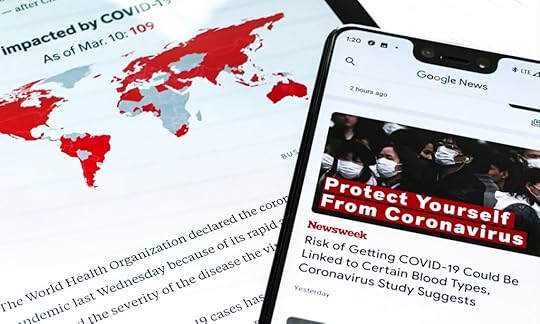
I started pursuing and writing about minimalism 12 years ago, in 2008, right in the middle of the global recession.
Back then, as you might expect, many were discovering
minimalism out of necessity.
I can remember some of the email messages I received back then. One of them stands out as particularly significant. A lady wrote to me:
I was searching for ways to live on less because my husband just lost his job and I found your website. I want to thank you for what you are doing. I am beginning to see that living with less doesn’t have to be a bad thing.
For the next 12 years, the economy grew. Until today, where every indication is that we are going to experience a fall in GDP for two successive quarters—the definition of recession. This recession will be global in nature.
I sat down this weekend to reflect on that fact. And how the coronavirus recession will impact minimalism going forward—not from a health standpoint, but a financial one.
First, let’s be clear, I want as many people as possible to live a minimalist lifestyle. The benefits are incredible: more time, more money, more energy, more focus, more opportunity to pursue those things in life that bring real happiness—however we choose to define it.
Minimalism is a lifestyle that should be adopted by
everybody.
But I don’t want anybody to be forced into it.
It is never an ideal circumstance for someone to lose
their job or be forced into a situation of having to live on less through a recession
or no fault of their own. I don’t want anybody, anywhere to be forced into
minimalism.
I want people to choose it on their own.
For two reasons:
1. When people are forced into minimalism, it is less likely to have a long-lasting effect. It might, but that is a rare case. Instead, when someone is forced into minimalism, they begin to see it as a sacrifice, a trial, or a setback. And as soon as life can financially return to the way it was before, people will return to their previous lifestyle.
2. Being forced into minimalism causes many people to adopt a disaster-focused mentality. Think of the generation that emerged from the Great Depression and their learned behavior to keep everything just in case they would need it someday.
And it doesn’t require a 10-year Depression for this scarcity-mindset thinking to emerge. Sometimes just a natural disaster—a hurricane, fire, or earthquake—can cause people to respond with a desire to hoard items for the uncertainty of the future.
People being forced into minimalism is never an ideal circumstance.
We prefer people to choose living with less on their own.
Of course, there are positive aspects that will emerge from this worldwide crisis that could spark voluntary simplicity:
1. There are a lot of people who are being forced to spend more time at home than before. When we are forced to spend time at home, we are also forced to confront our stuff and our possessions. We begin to see how much we’ve accumulated over the years—and how much is unnecessary.
Being at home means we can take the time to figure out how our home functions and what we want it to look like going forward. Maybe, as Michelle Obama recently said about the quarantine, “It’s a good exercise in reminding us that we just don’t need a lot of the stuff that we have.” This could be a response that many will have going forward.
2. The nature of work is going to change. Working from home is going to become commonplace in businesses all around the world—not just in the short-term, but in the long-term as business recognize the overhead that can be saved and more and more employees demand it. The change in how we work holds great potential in motivating people to declutter their spaces and environments at home.
3. Many people are going to reassess their finances and budgets. They will ask questions like: “Why weren’t we able to get ahead when finances were good? Where was all our money going? How much were we spending? And how much can we cut back both now and in the future?”
People may arrive at these questions because they are forced into them or simply from a desire to be more financially stable and prepared for the next crisis. Either way, many are going to stand face-to-face with their spending and start asking deep questions about whether their pursuit of physical possessions was really the best use of their limited resources.
4. Whenever we face legitimate concerns about life and death, we begin to ask deeper questions: “What is important in life? Where should I be focusing my time and my energy? Am I giving my family and friends as much focus as I should? Am I living my greatest life of significance and meaning?”
As we ask these questions about values and purpose, we run
into minimalist principles. Minimalism is, after all, about removing
distractions so we can focus on those things that matter most. Life’s deepest
questions often lead us there.
5. People will become intentional about re-entry into what they used to define as “normal.” Our lives, just a few weeks back, were busy, stressed, hurried, and rushed. As life begins to take on a new normal, many of us are going to become intentional and reassess what we desire to bring back into our lives. What commitments do we want back? What hobbies do we want to continue? And what purchases do I want to continue making going forward?
Final Thoughts
Remember this: You can’t control the people around you.
You cannot control how the entire world is going to respond to this pandemic
and subsequent recession.
We can invite people to minimalism. We can make the case
for it. We can argue for why it’s a better way of life that accumulating more
and more.
When it gets right down to it, we can invite others—but we
can only control ourselves. We can only take control of how we are going to
personally handle our lives going forward.
If you have found this blog post because you’ve recently been forced into owning less, I am sorry for your circumstances. But let me encourage you, you do not need to view owning less as a sacrifice. Owning less means you can find a more intentional life, focused on those pursuits that bring meaning, fulfillment, and joy to your life.
If you’ve been pursuing minimalism for quite some time, I encourage you to be intentional about re-entry into the world when this crisis ends—which it will. Stay focused on those things that add value to our life, that bring lasting joy into our life, that help you pursue your values—and not those that distract you from it.
There is no doubt in my mind that this current crisis is
going to affect the world in countless ways. Minimalism, as a lifestyle, will
be positively and negatively affected—both individually and as a society.
Let’s make sure we learn from it as best we can.

March 27, 2020
Inspiring Simplicity. Weekend Reads.
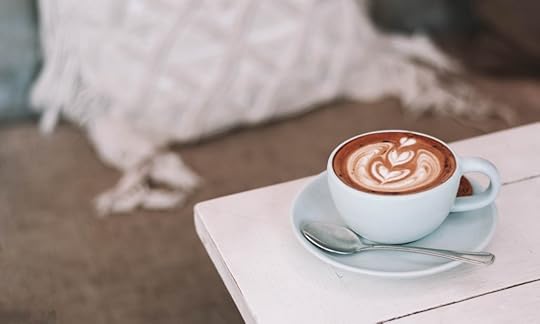
Crazy days we’re living in, aren’t they?
Thank you for being part of the Becoming Minimalist community. I believe, in times like these, it is even more essential to focus on things that matter. Minimalism paves that pathway.
By owning fewer possessions, we reserve time, money, and energy for the things that matter most. So take some time to focus on the things you own and what can be removed (today or in the future).
We’ll get through this—and we’ll be better because of it.
To keep your mind focused on simplicity and intentional living, here is a personally selected list of encouraging articles that have been published recently:
How I am Minimizing My Wardrobe | Recovering Women Wealth by Deanna Broaddus. As I embrace less with my wardrobe I can see the benefits.
Embracing “Involuntary Simplicity” | No Sidebar by Emily McDermott. While I do not want to downplay the economic impact of closed businesses and canceled events and services, let alone the impact on vulnerable populations who may find themselves isolated, I believe there are some important mindset shifts that can help us embrace “involuntary simplicity” as much as possible during this tumultuous time.
Thoughts on Downsizing | Hej Doll by Jessica Doll. Sharing some of my thoughts on downsizing before, during, and after our move to a smaller space.
Expert Tips on Decluttering Your Home During the Coronavirus Pandemic | LA Times by Lisa Boone. Helpful ideas if you’re looking.
Minimalism in a Crisis | Joshua Becker on YouTube

March 25, 2020
25 Things to Do with Your Family While Stuck at Home

As with most the world, we’ve been spending a lot more time at home in recent days.
It’s important, in these unique times, to redeem the hours and make the most of the moments we have together. There are negative ramifications to the current state of affairs in our world—and you don’t need to see them broadcast in the media, many of you are experiencing them firsthand.
But the negative effects of the Coronavirus do not need to overwhelm us. We can also choose positive effects: spending time with family, taking longer rests, finding solitude, and escaping the busyness of our normal lives.
With that in mind, here’s my list of 25 things to do while stuck at home to redeem the time and make the most of it.
0. Wake up, get dressed. I need to include this one here because it’s important to start each day with the right attitude. Every day is an opportunity to make the most of it. Don’t miss a single opportunity—regardless of the circumstances around you.
1. Declutter. Minimize your possessions and declutter the stuff in your home. The more we spend time in our home, the more we can recognize what can and should be removed—and the more time we have to do it. Check out Clutterfree if you’re looking for steps to get started
2. Learn new card games. I grew up playing cards‚ even as a young child. And not just Go Fish and War, but strategy games like Hearts, Spades, Rook, and Pinochle. They taught me how to think ahead, play out scenarios, and learn from others. All valuable life skills.
3. Make phone calls. Safe to say the phone call is making a comeback. All those people you would usually see at work, church, or social gatherings, give them a call to say hello.
4. Teach your kids life skills. My son is a junior in high school and my wife and I have a long list of life skills we want him to know before he leaves the house. We’ve been using these weeks to make up for lost time. If you haven’t already, use the time to teach your kids cooking, laundry, cleaning, car repair, budgeting, or any other life skills that come to mind.
5. Go outside. If still allowed in your local area, go on long walks or hikes. Spend time in the park or walk along the river.
6. Workout. We need to be taking care of our physical bodies and taking care of our physical fitness during this time as well. Look up at-home workouts/yoga on YouTube or Google and do them together as a family.
7. Watch educational programs. I see a lot of people spending time on Netflix—binging movies and television shows. And there’s certainly a place for that. But you can also watch educational documentaries on Netflix and YouTube about history, science, or events in the world.
8. Learn a new skill. Been wanting to pick up a hobby? Now’s your chance. Learn a new language or how to code. Pick up an instrument or new artistic skill. Because of the Internet, finding a teacher (free or paid) has never been easier.
9. Create. I started this blog as a hobby—somehow it grew to over 2M readers/month. Start something of your own. Create a blog or a YouTube channel. Write some stories or poetry. Or use your hands in the workshop. Create something, we need you now more than ever.
10. Do a Facebook Live. Nothing to it. Just click a few buttons on your phone and suddenly all your friends can see you. It’s super fun. If you haven’t before, now’s your time.
11. Write letters. To a family member or friend you haven’t seen in awhile.
12. Invent a game. Looking around the room at the supplies you have, make up a game to play with your kids. Or better yet, invent an entire Family Olympics where each member of the family gets to pick 1-2 of the events. Keep a running total of the points.
13. Read books. You should probably be doing that anyway.
14. Late night movie with the family. Depending on your local school situation of course. But if it works, there’s nothing more fun for little kids than staying up past bedtime, eating popcorn, and watching a movie with mom or dad. Make it happen.
15. Video chat with friends. Whether it’s on FaceTime, Skype, Facebook Messenger or Zoom, connect and hang out online for a little while.
16. Home repairs or a deep clean. Make up some ground on that list of yours.
17. Sort through boxes of old photos. Keep the best and put them in photo albums or digitize for future generations.
18. Clean up your computer digital files. Here.
19. Curate and organize your recipe/cookbook stash. I use index cards to keep all my favorites in the same place.
20. Make up TikTok dances with the family. I see a lot of those short, choreographed dances being posted. Super fun for everyone.
21. Create games to share with family members. Invent a WordSearch or Crossword Puzzle using the members of your family and send them out for everyone else to complete during their downtime.
22. Take a class online. You can find plenty of courses for kids and adults available for free online. Including Yale’s most popular college course ever.
23. Order takeout and have a picnic. If your local community still allows that, you can support local business and enjoy time outside as a family (weather-permitting of course).
24. Research your family tree. You can use online tools or do it the old-fashioned way—calling family members to begin piecing it together.
25. Learn online tools for business. One’s thing is for sure—business is going to change going forward. Learn as quick as you can how remote work is accomplished: Zoom, Slack, Skype, Dropbox, and numerous others. Now’s your time to learn them.
There are so many options to make the most of the time now—and probably ahead of us for a little bit longer.
What have you been doing that could be added to the list?

March 21, 2020
Clutterfree
Clutterfree is the very first app on the market to create a personalized, step-by-step roadmap to declutter your home.
I’ve spent the last 8 months working on it with a US-based team of developers and designers. We’ve equipped it with everything you need to declutter your home and life—all in the palm of your hand.
For the last decade, my passion has been to help people discover more life by owning fewer possessions. Excess possessions rob us of money, time, energy, and focus and they quickly become a burden and distraction. That is why more and more people, all around the world, are choosing to declutter their homes and lives.
That is why I built the app—to help people own less stuff and live a better life!
Clutterfree contains all I’ve learned over the last decade helping people own less through my blog, books, videos, and the Uncluttered Course. And then, to make it even more helpful, I pulled in experts from around the world to help you tackle even the most difficult areas in your home.
It is going to entirely change how people declutter their homes and lives.
Who Clutterfree Is For
My passion, from the very beginning, has been to help people who own too much realize that reality and begin to own less. That describes a large percentage of the 2 million monthly readers of Becoming Minimalist. And that is who I had in mind when designing the app.
*If you are just discovering the movement to own less and want to begin applying these principles in your home, Clutterfree is for you.
*If you want to own less but don’t know where to start, Clutterfree is for you.
*If you have been working to declutter your home and want extra help, Clutterfree is for you.
*If you find yourself motivated to start but quickly become frustrated or distracted in your progress, Clutterfree is for you.
*If you’re motivated by a personalized step-by-step roadmap or just love to check off lists, Clutterfree is for you.
*If you are living a minimalist life, but have a parent, friend, or family member who would benefit from owning less, Clutterfree is for them—and makes for a life-changing gift.
How It Works
When I was first approached about the idea of building an app, I took a look at the different decluttering apps currently on the market.
Surprisngly, there were very few. And those that were available offered simple, rigid steps: “Declutter candlesticks.” “Declutter napkins.”
There were no declutteirng apps that took into account an individual’s unique home, family, or trouble areas. But I have learned that taking into account all those different factors is essential to decluttering success. That is what makes Clutterfree so unique.
It is the first app on the market to create a personalized, step-by-step roadmap to declutter your home. After logging-in, users upload their unique home into the app, and the app creates a personalized room-by-room Clutterfree plan, just for you.
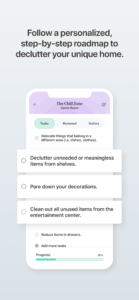 Additionally, the app allows you to track progress, unlock achievements, document donations, take photos, and discover daily motivation to keep focused.
Additionally, the app allows you to track progress, unlock achievements, document donations, take photos, and discover daily motivation to keep focused.
The app also contains free Bonus Plans from experts all over the world to help you get through some of the most difficult areas in your home: Paper Organization 101, Teaching Kids to Declutter, Decluttering Books, Clutterfree Habits… with more and more Bonus Plans being added each week.
I’m proud of it. It is going to help so many people and honestly, it is going to change how people declutter their homes and lives. The connection between a person and their phone is an intimate connection, and now we’re able to deliver the most valuable insights directly to you.
The Clutterfree app is not free, but we do provide a free 7-day trial so you can see if it is helpful to you.
If you find it helpful, the monthly cost is $5.99 to use the app. Keep Clutterfree only as long as you need it. If you know you’ll need it for more than a few months, there is a discounted price available for 6 months and an even greater discount for a year subscription. The choice is yours.
Get it Today
The app just released today. You can find it here for Apple devices or Android devices in the US, UK, Canada, and Australia. *If it is not yet available in your area, it is coming soon.
If you are wanting to own less, I encourage you to check it out.
Download it today to start your free trial.
Or take a moment to share it with a friend.
Thank you for being part of the movement to own less and live more,
—Joshua





